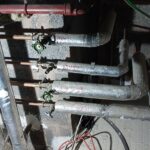Legionella Infection: Transmission, Risk Factors, and Control Guidance
The likelihood of developing legionellosis depends on the vulnerability of the individual and the route of exposure. The primary means of infection is through inhaling aerosols—tiny airborne particles that originate from droplets. These aerosols are typically produced when water is sprayed (e.g. from showers, irrigation systems) or splashes onto surfaces (e.g. turning on a tap… Read more »
Meet Martin – PPM Engineer
Length of service as of April 2023 – 12 months I have been at GMS for around 12 months now and during that time I have been working as a water hygiene engineer. My day to day tasks are to carry out the planned preventative maintenance side (PPM) taking water temperatures, servicing expansion vessels ,calorifiers,… Read more »
Rapid Legionella Testing
If you are concerned with the quality of your water and would like rapid peace of mind, GMS have the solution. We can provide rapid legionella tests for you or your own staff to apply yourself, or we can attend site and apply the tests for you. Results can be provided within 25 minutes for… Read more »
Monthly Surveillance Report – April 2018
The latest figures are available. See the link below to the HSE report. https://assets.publishing.service.gov.uk/government/uploads/system/uploads/attachment_data/file/705178/Monthly_Legionella_Report_-_April_2018.pdf
Legionella Sampling – Legionella PCR (Polymerase Chain Reaction)
Legionella Sampling – PCR versus Culture Technique PCR is a molecular biology technique in which the DNA of micro-organisms is extracted and then amplified (multiple copies are made). This enables the laboratory to determine the presence and quantity of that organism’s DNA in a water sample. As it is the DNA that is being assessed,… Read more »











